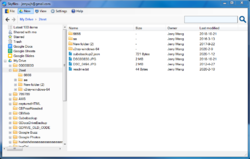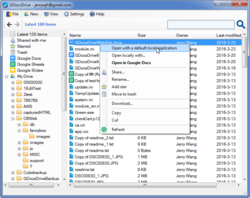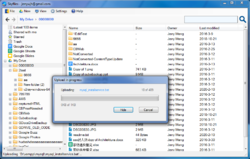English
Every day we offer FREE licensed software you’d have to buy otherwise.

$29.00
EXPIRED
Giveaway of the day — Skyfiles 4.0
Directly modify Google Drive files with desktop applications!
$29.00
EXPIRED
User rating:
28
12 comments
Skyfiles 4.0 was available as a giveaway on March 10, 2023!
Today Giveaway of the Day
Control remote desktop or laptop from any device and anywhere!
Skyfiles is a third-party Google Drive client, which allows you to manage Google Drive files with your desktop apps instead of working through a browser.
With Skyfiles, you can edit/view Google Drive files with your local software.
Unlike Google's Backup and Sync, which cost lots of your local storage, Skyfiles is disk-free.
System Requirements:
Windows 7/ 8/ 10/ 11
Publisher:
GDocsDriveHomepage:
https://www.skyfiles.net/File Size:
7.9 MB
Licence details:
Lifetime
Price:
$29.00
How would you improve Skyfiles 4.0?
GIVEAWAY download basket
Developed by Microsoft
Developed by Acro Software Inc.
Developed by Tracker Software Products Ltd
Developed by BizAgi Limited
Comments on Skyfiles 4.0
Thank you for voting!
Please add a comment explaining the reason behind your vote.
Please add a comment explaining the reason behind your vote.
You can also add comment viaFacebook
iPhone app giveaways »
$19.95 ➞ free today
$0.99 ➞ free today
Every Day Spirit is a collection of beautiful, original, hand-crafted wallpapers created to make your phone look amazing.
$0.99 ➞ free today
$4.99 ➞ free today
$1.99 ➞ free today
Android app giveaways »
$0.99 ➞ free today
$0.99 ➞ free today
Spelling Right is a new challenging educational spelling game that will test your English spelling skills.
$2.29 ➞ free today
$0.99 ➞ free today
$1.49 ➞ free today





The software downloads the files temporarily and once we finish working on the files, it syncs these back. So, the same amount of data is used as it would be if we download a file from G drive and then upload it. So what's the point of having it?
Save | Cancel
Is this different from SkyDrive?
Save | Cancel
Paul Wright,
>"Is this different from SkyDrive?"
SkyDrive was the name used by Microsoft before they changed it to OneDrive.
Skyfiles used to be called GDocsDrive. They are not the same thing, nor have the exact same function(s).
Save | Cancel
This seems to be a good product. I'll give it a try. Thanks
Save | Cancel
So easy to install, configure and use.
This is a welcome and useful addition to my tool kit.
Save | Cancel
can someone explain plainly what this does and why its useful?
Save | Cancel
creatrix, I think you are right, it's just like Google B&S "Steam file mode"
Save | Cancel
krypteller, If you do not have proprietary docs and client data to store in the cloud, you are OK, otherwise you are propagating and advertising to uncle Sam what you really are doing. NSA can not wait to see what you are up to.
How about the hackers and the rogue employee with master password looking at what you are doing and if there is something they can get to use against you.
How about the cloud backups that are done on daily bases, where are they stored and by whom and who has access to them.
What happen to the data when you unsubscribe to the service, does it remain property of the "cloud"?
Those are the things that push me back from such services, where you depend on someone else's servers to get to your data files. What if the Internet is down in your area, are you gonna seat all day and waiting and waiting. What if you are unable to access their server for many other reasons?
Do not tell me you have local backup in your computer and duplicate of the files in a local PC, that would defeat the purpose of the cloud storage.
Save | Cancel
Good day, I'm a user like you are. But I use today's app, and it does download very heavy video audio with no problems or with 'drag & drop' action. And it has got more quick and useful function than google-drive. Every work is faster than in google account.
Have a nice day.
Save | Cancel
FWIW...
"... otherwise you are propagating and advertising to uncle Sam what you really are doing. NSA can not wait to see what you are up to."
*IF* the NSA or whatever gov entity is going to hack into your files, the major cloud service providers are more secure than local storage -- if they could get into your cloud accounts, then they most certainly could get into your local systems more easily.
"How about the hackers and the rogue employee with master password looking at what you are doing and if there is something they can get to use against you."
Far as hackers / cybercriminals go, the major cloud services have much better staffed security teams than you could ever pay for. When/if there's a problem it's most always a software vendor, e.g., VMWare, or the customer screwed up their configuration. Regarding rogue employees, that's your responsibility -- any measures you'd take locally do the same with the cloud.
"What happen to the data when you unsubscribe to the service, does it remain property of the "cloud"?"
Cloud service providers exist to make money. Tying up storage capacity with data they're no longer paid to store is throwing money away, so it's not gonna happen.
"What if the Internet is down in your area, are you gonna seat all day and waiting and waiting. What if you are unable to access their server for many other reasons?
Do not tell me you have local backup in your computer and duplicate of the files in a local PC, that would defeat the purpose of the cloud storage."
If your stuff is important, then yes, it needs to be stored in more than one place, whether that includes local storage or multiple cloud accounts. Your local storage is Less reliable than the cloud. Most biz ISPs offer guaranteed 99% or better uptime, & there's always cellular.
Save | Cancel
mike, Hi Mike, are you giving your answer or is the first account just your same name? I'm totally confused which mike is real?
Save | Cancel
The problem is not that there are lots of rogue employees at each company or that the govt is going to hack into every person's data at every online company because that takes time and a lot of CPU, though they are getting much faster at brute forcing them. They don't have to hack in because they already have full access.
The problem is under the Patriot Act the govt has threatened to prosecute under the excuse of protecting people from "bad guys" every large telecom and Internet data company unless they provide all data to the govt through back doors. Every byte of data you send through your ISP or cell phone, including every private message, email, URL request, or social media post gets a copy sent to the govt whose AI algorithms sift through and store the data. Google does the same and all this data ends up in govt searchable databases.
AFAIK, very few companies have not complied. The ones that refused, such as True Crypt, chose to shut down than add the back doors. At this point I would assume every company and every recent encryption and zip software has back doors in it. The Patriot Act had unintended consequences. This is my current understanding of things.
Save | Cancel